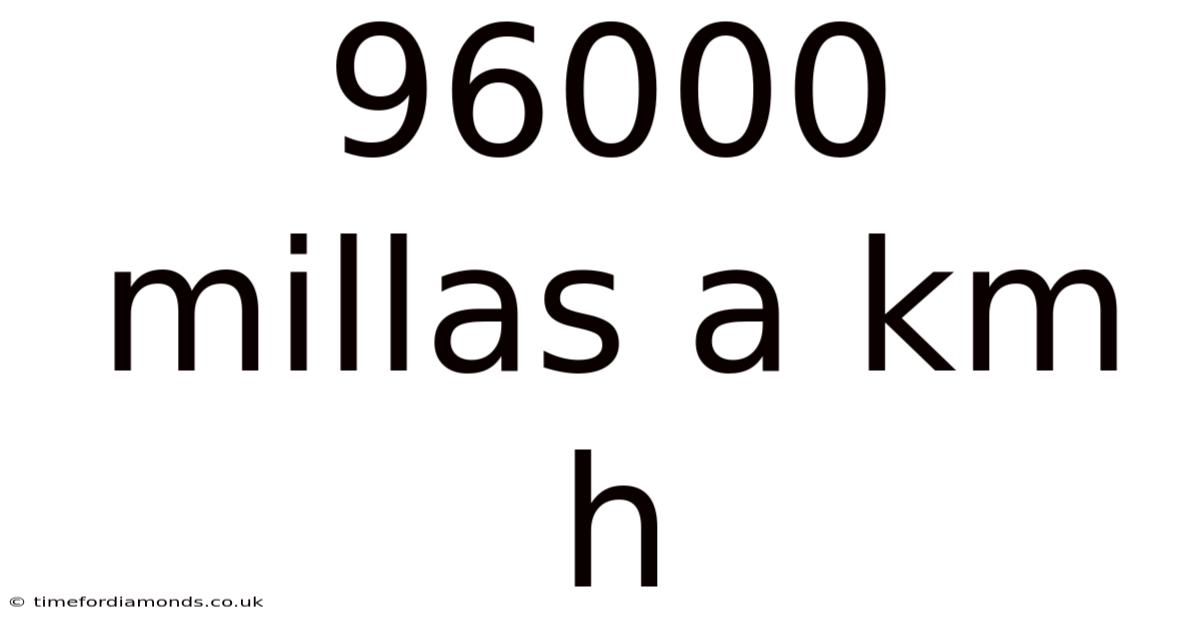96000 Millas A Km H
timefordiamonds
Sep 15, 2025 · 5 min read

Table of Contents
Converting 96,000 Miles to Kilometers per Hour: A Comprehensive Guide
Are you wondering how to convert 96,000 miles to kilometers per hour? This seemingly simple conversion involves understanding the relationship between miles and kilometers, and then applying that knowledge to a speed measurement. This article will delve into the process step-by-step, explain the underlying principles, and provide context for understanding such a high-speed measurement. We will also explore potential real-world applications and address common misconceptions. Understanding this conversion is crucial for anyone working with international units, navigating global data, or simply wanting to grasp the scale of high-speed travel or phenomena.
Understanding Units of Measurement: Miles and Kilometers
Before diving into the conversion, let's establish a firm understanding of the units involved: miles and kilometers. Both are units of distance, but they belong to different systems of measurement.
-
Miles (mi): A unit of length in the imperial and US customary systems. One mile is approximately 1.609 kilometers.
-
Kilometers (km): A unit of length in the metric system. One kilometer is equal to 1000 meters.
The difference in these units stems from the historical development of measurement systems. The metric system, based on powers of 10, is internationally preferred for its simplicity and ease of conversion. The imperial system, while still used in some countries, is less consistent and requires more complex conversion factors.
Step-by-Step Conversion: 96,000 Miles to Kilometers
The conversion of 96,000 miles to kilometers is straightforward. We simply need to multiply the number of miles by the conversion factor: 1 mile ≈ 1.60934 kilometers.
1. Set up the conversion:
96,000 miles * 1.60934 kilometers/mile
2. Perform the calculation:
96,000 miles * 1.60934 km/mile = 154,491.04 kilometers
Therefore, 96,000 miles is approximately equal to 154,491.04 kilometers.
Speed and the Conversion: Kilometers per Hour (km/h)
The initial question involved a speed, not just distance. The conversion we performed above only addressed the distance component. To express 96,000 miles as a speed in kilometers per hour (km/h), we need additional information: time.
The number 96,000 miles without a time element simply represents a distance. To express it as a speed, we need to know how long it took to travel those 96,000 miles. For example:
-
If it took 1 hour to travel 96,000 miles: The speed would be 96,000 miles/hour. Converting this to km/h would be: 96,000 miles/hour * 1.60934 km/mile ≈ 154,491.04 km/h.
-
If it took 10 hours to travel 96,000 miles: The speed would be 96,000 miles / 10 hours = 9,600 miles/hour. Converting to km/h: 9,600 miles/hour * 1.60934 km/mile ≈ 15,449.10 km/h.
The crucial point is that speed is distance divided by time. Without knowing the time taken to cover 96,000 miles, we can only convert the distance to kilometers; we cannot express it as a speed in km/h.
Real-World Applications and Context
Understanding conversions like this is important in various fields:
-
Aviation: International flights often use nautical miles and kilometers per hour. Converting between units is essential for air traffic control and navigation.
-
Space Exploration: Calculating speeds and distances in space exploration requires accurate conversions between different unit systems. Distances to other planets or celestial bodies are frequently expressed in both miles and kilometers.
-
Automotive Industry: Testing vehicle performance might involve speeds measured in miles per hour, while international reports and comparisons often use kilometers per hour.
-
Physics and Engineering: Many scientific and engineering calculations necessitate consistent unit usage, and conversions are a cornerstone of ensuring accuracy.
-
Global Data Analysis: Datasets containing speed or distance data might use different units. Conversions are crucial for accurate data analysis and comparison.
Common Misconceptions and Pitfalls
-
Ignoring the time element: Remember, speed requires both distance and time. Converting only the distance is incomplete when dealing with speed.
-
Using inaccurate conversion factors: Using an inaccurate conversion factor (e.g., rounding 1.60934 to 1.6) will lead to errors, especially when dealing with large numbers like 96,000.
-
Confusing units: Be careful to distinguish between miles and kilometers, and hours and other time units. Ensure you're using the correct units in each step of the calculation.
Frequently Asked Questions (FAQ)
Q: What is the precise conversion factor for miles to kilometers?
A: The precise conversion factor is approximately 1.609344 kilometers per mile. However, for most purposes, 1.60934 is sufficiently accurate.
Q: Can I convert miles per hour directly to kilometers per hour?
A: Yes, you can. Simply multiply the speed in miles per hour by the conversion factor (1.60934).
Q: Why are there different systems of measurement?
A: Different systems developed historically in different parts of the world. The metric system is now the internationally preferred system due to its simplicity and consistency.
Q: Are there any online converters for this type of calculation?
A: Yes, many online converters are available to perform unit conversions quickly and accurately. However, understanding the underlying principles remains crucial.
Conclusion
Converting 96,000 miles to kilometers involves a straightforward calculation, but understanding the underlying principles of unit conversion and the difference between distance and speed is paramount. We've demonstrated that 96,000 miles equates to approximately 154,491.04 kilometers. However, to express this as a speed (km/h), the time element is indispensable. Always double-check your units and conversion factors to ensure accuracy, especially when dealing with large numbers or significant applications. Mastering unit conversions is fundamental to success in numerous scientific, engineering, and practical fields. This knowledge empowers you to accurately interpret and analyze data from various sources and to confidently navigate the complexities of global measurement systems.
Latest Posts
Related Post
Thank you for visiting our website which covers about 96000 Millas A Km H . We hope the information provided has been useful to you. Feel free to contact us if you have any questions or need further assistance. See you next time and don't miss to bookmark.